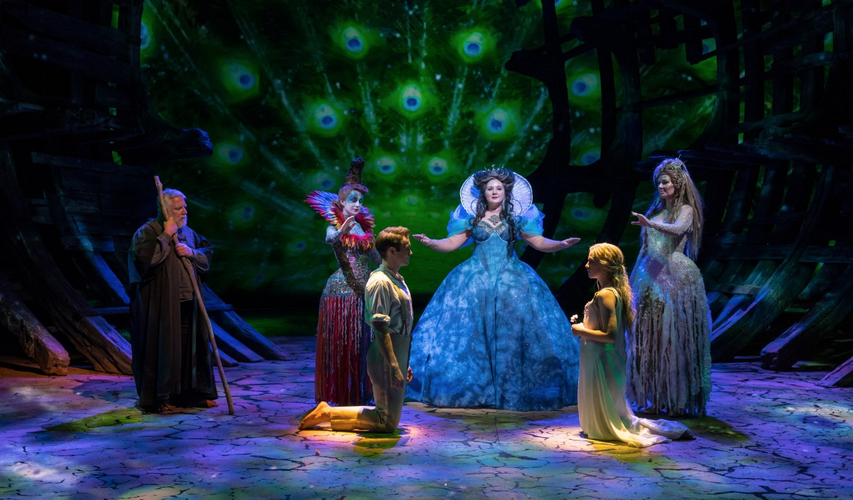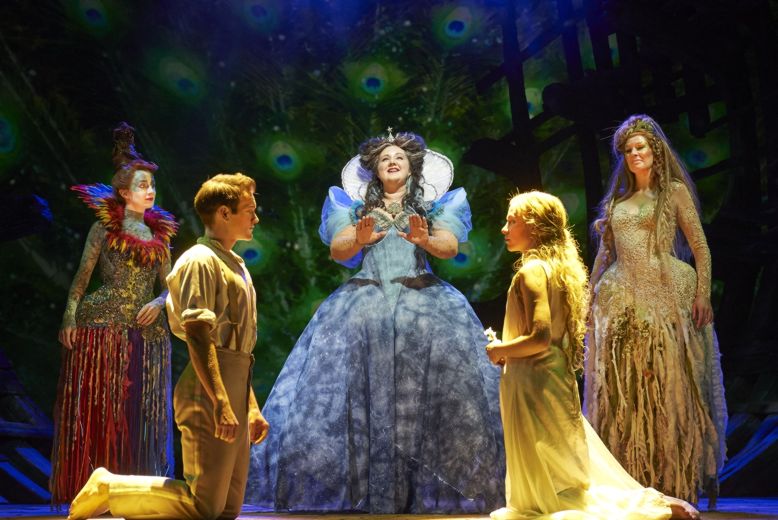CERES Highest queen of state,
Great Juno comes; I know her by her gait.
JUNO How does my bounteous sister? Go with me
To bless this twain that they may prosperous be,
And honoured in their issue.
They sing.
JUNO Honour, riches, marriage-blessing,
Long continuance and increasing,
Hourly joys be still upon you;
Juno sings her blessings on you.
CERES Earth’s increase, foison plenty,
Barns and garners never empty.
Vines with clustering bunches growing,
Plants with goodly burden bowing;
Spring come to you at the farthest,
In the very end of harvest.
Scarcity and want shall shun you,
Ceres’ blessing so is on you. (4.1.101-117)
Although both an implicit stage direction (her peacocks fly amain) and an explicit one (JUNO descends) have announced the appearance of Juno some twenty-five lines previously, this is when Juno finally arrives in the scene. The descent has presumably been slow and stately, allowing the audience plenty of time to admire the spectacle, especially if she is indeed in a chariot drawn by peacocks. Her descent would necessarily be carefully controlled; the dialogue (and perhaps music as well) would be needed to cover (or at least distract from) the sound of the ropes and the winch, as she is lowered from the trapdoor in the heavens. It’s vanishingly unlikely that 1611 Juno had to wear a safety harness which would need to be unclipped … but there’s time allowed for her to make a stately dismount from her chariot, and to approach Iris and Ceres, moving (one assumes) with dignity and grace, and not the tripping gait associated with the lesser spirits. Now that she has arrived, the singing proper can begin, to bless Ferdinand and Miranda with prosperity and with children who will honour them (and be an honour to them). Juno sings of just these things, with both long life (and a long-enduring, happy marriage) and hourly joys, frequent and regular moments of happiness. She speaks for the happiness of the marriage, and for there to be many children born of it; Ceres blesses the couple with material plenty, which also stands for the fertility of the relationship. They will never be hungry, but rather they will always have grain in their garners (there had been riots over the price and scarcity of grain in England only a few years earlier). They will have abundant harvests, plentiful crops, wine and vegetables. Winter will not matter, if it even exists; spring will instead follow at the end of autumn, in the very end of harvest. You will want for nothing, you will always have enough, more than enough. You will be blessed. (There’s another version of this vision of peace and plenty at the end of Henry VIII, in the prophecy made at the christening of the future Elizabeth I; it is biblical in its language and reminiscent of the classical golden age.)
No music survives, but it was surely in a far more elevated style than the songs performed by Ariel, which they accompanied (wholly or in part) themselves; all the musical (and visual) resources of the company would be thrown at this. What matters in performance now, I think, is that the masque is in a completely different idiom to the rest of the play, visually and musically, whether that’s through costume in a different period or style, or (as in the case of the most recent RSC production in 2016) a shift in the style of the astonishing video projections from near-photo-realist, albeit digitally enhanced, to (initially) Hockney-esque landscapes and then enormous floral graphics. And the score, and the singing, became fully operatic, Mozartian pastiche; there’s brief glimpses here, although not, alas, the music.



